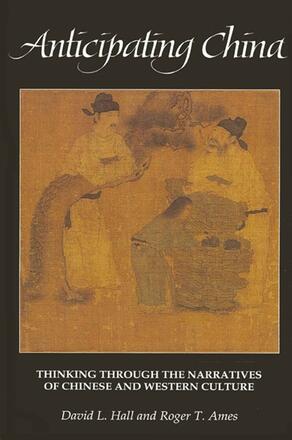
Anticipating China
Thinking through the Narratives of Chinese and Western Culture
Alternative formats available from:
This book shows that failure to assess the significant cultural differences between China and the West has seriously affected our understanding of both classical and contemporary China, and makes the translation of attitudes, concepts, and issues extremely problematic.
Description
By providing parallel accounts of the contrasting developments of classical Chinese and Western traditions, Anticipating China offers a means of avoiding the implicit cultural biases which so often distort Western understanding of Chinese intellectual culture. The book shows that failure to assess the significant cultural differences between China and the West has seriously affected our understanding of both classical and contemporary China, and makes the translation of attitudes, concepts, and issues extremely problematic.
David L. Hall is Professor of Philosophy at the University of Texas at El Paso and author of a number of works, including Eros and Irony: A Prelude to Philosophical Anarchism; Thinking Through Confucius (with Roger T. Ames); The Arimaspian Eye (a philosophical novel); and Richard Rorty: Poet and Prophet of the New Pragmatism, all published by SUNY Press. Roger T. Ames is Professor of Philosophy and editor of Philosophy East and West. He is the author of The Art of Rulership: A Study in Ancient Chinese Philosophical Thought; Thinking Through Confucius (with David L. Hall); co-editor of Nature in Asian Traditions; Self as Body in Asian Theory and Practice; and Self as Person in Asian Theory and Practice, all published by SUNY Press.
Reviews
"The extensive and masterful command of Western philosophy, including the contemporary period, makes the book truly exciting instead of just another competent scholarly study. The bold insight of the authors is mountain air. The pure artistry of the writing rushes readers along until they are stopped by the shock of finding Hall and Ames saying exactly the right thing to illuminate important areas of cultural concern in at least four areas. The treatment of pre-Socratic philosophy is not just a rehash, but offers new insights (so much so that I thought of using it as a text in Ancient Philosophy class). The material on ancient China enriches what the authors began to do in Thinking Through Confucius. The assessments of differences between China and the West often render contemporary Western philosophers in new, illuminating perspective. Finally, the book contributes fundamentally, instead of anecdotally, to the enterprise of seeking to understand contemporary Asia.
"I have been looking for this book for twenty years. In reading postmodern philosophers, I have often written in the margins the observation that 'this labored and over-wrought point is plain in Asian thinking. ' I generally wondered how it was that scholars of the stature and imagination of Paul Tillich or Richard Rorty could be so scintillating and intelligent and yet be embarrassingly ignorant of anything Asian. Hall and Ames are leaders in systematically articulating the connections that many of us have vaguely felt, and looked for, and thought obvious in one or another instance. "--John Rothfork